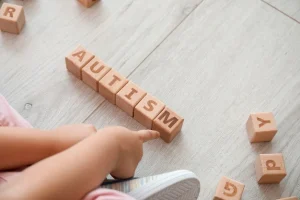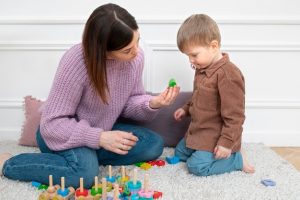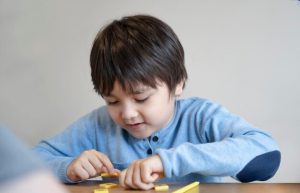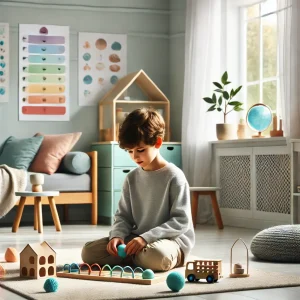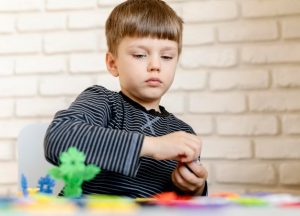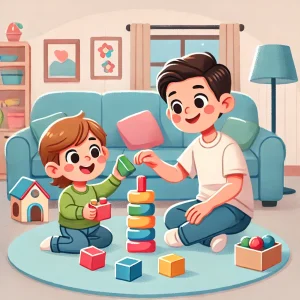Top Tips for Keeping Your Child with ADHD Focused
Last Updated: September 30, 2024
Raising a child with ADHD can be both rewarding and challenging. Kids with ADHD often struggle to focus, follow instructions, or complete tasks without getting sidetracked. This can make daily routines like homework, chores, or even playtime feel overwhelming—for both you and your child. But you’re not alone in this. There are simple, effective strategies that can help your child stay on track and make life a little easier for your family. In this article, we’ll share practical tips and insights to support your child’s unique needs, from building structured routines to balancing activity and rest.
Understand Your Child
Every child with ADHD is unique, and understanding your child’s specific needs is one of the most important steps you can take. No two children experience ADHD in the exact same way—what works for one child may not work for another. This is why it’s crucial to take the time to observe and understand your child’s behavior, strengths, and challenges.
Start by paying attention to when and where your child struggles the most with focus. Is it during certain times of the day? Are there specific activities that are particularly difficult? Maybe they lose concentration quickly during homework, or perhaps they find it hard to follow through with chores. By identifying these patterns, you can begin to tailor your approach to suit your child’s unique needs.
Also, notice the moments when your child is most engaged and focused. Are they able to concentrate better when there are fewer distractions, or when they’re involved in something they enjoy? Understanding these factors can help you create a more supportive environment that plays to their strengths.
Also read: Advantages of Online Counseling for Kids with ADHD
Break Tasks Down
Big tasks can be overwhelming for kids with ADHD. To make it easier, break tasks into smaller, simple steps. For example, if your child has homework, start with Step 1: Gather all materials like pencils and books. Step 2: Read the instructions together. Step 3: Start with the first question. By focusing on one step at a time, the task becomes less intimidating and easier to handle.
Use Positive Reinforcement
Kids with ADHD respond well to positive reinforcement. Praise them when they do something good, like finishing a task or staying focused. Simple rewards like saying, “Great job!” or offering a small treat can make a big difference. It’s important to acknowledge their efforts, not just the final result. This boosts their confidence and encourages them to keep trying.
Also Read: Top 5 Tips for Keeping Your ADHD Child Focused and Engaged
Include Breaks
Kids with ADHD need short breaks to help them stay focused. Breaks allow them to recharge and come back to tasks with fresh energy. A good idea is to let them take a 5-minute break after 20-30 minutes of work. They can stretch, move around, or do a quick activity they enjoy. These small breaks can help them feel less tired and more focused.
Reduce Distractions
A quiet and organized space helps kids with ADHD focus better. Reduce distractions by turning off the TV, limiting screens, and keeping the workspace tidy. Make sure the area is free from unnecessary noise and clutter. If noise is a problem, consider using headphones or soft background music to create a calm environment. A few changes can make it much easier for your child to concentrate.
Create a Routine
One of the best ways to help your child with ADHD stay focused is by establishing a consistent daily routine. Children with ADHD often thrive on structure because it provides a sense of predictability and security, making it easier for them to know what to expect and what’s expected of them. A well-structured routine can help minimize distractions and keep your child on track throughout the day.
Start by setting up a daily schedule that includes time for all essential activities, such as waking up, meals, schoolwork, playtime, and bedtime. Consistency is key—try to keep the schedule the same every day, even on weekends. This doesn’t mean the day has to be rigidly planned, but having a general flow can help your child feel more in control and less overwhelmed by transitions.
Visual aids like charts or calendars can be incredibly helpful. Kids with ADHD often respond well to visual cues, so consider creating a colorful chart that outlines their daily routine. You can use images or icons to represent different tasks, which makes it more engaging and easier to follow. For younger children, a sticker or reward system can be added to the chart as a fun way to motivate them to stick to the routine.
Also read: How Behavioral Therapy Helps Kids with ADHD
Teach Relaxation Techniques
Children with ADHD often feel restless, which can make focusing even harder. Simple relaxation techniques, like deep breathing, can help. Teach your child to take slow, deep breaths: inhale through the nose, hold for a moment, and then exhale through the mouth. This can calm them down and help them focus.
Mindfulness is another great tool. It involves paying attention to the present moment, which can reduce stress. Try activities like listening to the sounds around them or noticing how their body feels. These small exercises can help your child manage their ADHD symptoms better.
Work with Teachers
Since your child spends a lot of time at school, working with their teachers is important. Talk to your child’s teacher about their ADHD and what strategies work at home. Teachers can often use similar methods in the classroom to help your child focus.
Ask about things like seating arrangements, extra time for tasks, or short breaks to help your child stay on track. Keeping in touch with teachers ensures that everyone is working together to support your child.
Focus Strategies at Home and School
| Strategy | At Home | At School |
|---|---|---|
| Structured Routine | Implement a daily schedule that includes set times for waking up, meals, schoolwork, play, and bedtime. Use visual charts or planners to display the routine, making it easier for your child to understand and follow. | Use a clear and consistent class timetable that outlines daily activities. Teachers can use classroom schedules that are visually accessible, helping students know what to expect and when. |
| Break Tasks into Steps | Break larger tasks, like homework or chores, into smaller, more manageable steps. Use checklists to help your child track their progress and feel accomplished as they complete each part. | Teachers can break down assignments into smaller sections, providing clear instructions for each part. Offering extra time for tasks allows students to work at their own pace without feeling overwhelmed. |
| Positive Reinforcement | Use praise and rewards, such as stickers or small treats, to encourage and reinforce good behavior and task completion. Acknowledge efforts, not just outcomes, to build confidence. | Teachers can use verbal praise, stickers, or other small rewards to recognize positive behaviors and accomplishments in class. Encouraging words can motivate students and reinforce their efforts. |
| Minimize Distractions | Create a quiet, organized workspace for your child with minimal distractions, like turning off the TV and limiting screen time during focus periods. Use noise-canceling headphones if needed. | In the classroom, preferential seating can help reduce distractions, such as placing the child away from windows or doors. Teachers can provide quiet time or use fidget tools discreetly to help students maintain focus. |
Be Patient
Progress takes time, especially when managing ADHD. Some days will be better than others, and that’s completely normal. The key is to stay patient and keep encouraging your child, even when things are tough.
Celebrate small wins and remind your child that it’s okay to make mistakes. Patience and a positive attitude will help build their confidence and improve their focus over time.
Conclusion
Managing ADHD in children can be challenging, but with the right strategies, it becomes manageable. Focus on understanding your child’s unique needs and creating a supportive environment at home. Establish a consistent routine, break tasks into smaller steps, and use positive reinforcement to encourage good behavior. Short breaks can help your child reset, and reducing distractions can improve concentration. Remember, progress may be slow, but every step forward counts. Celebrate small victories, work closely with teachers, and be patient. With support from resources like Wellness Hub, your child can learn to thrive and succeed in their own way. Your efforts truly matter!
Frequently Asked Questions:
1. How can I help my child with ADHD stay focused?
To help your child with ADHD stay focused, try creating a structured routine, breaking tasks into smaller steps, using positive reinforcement, and minimizing distractions. Regular breaks and simple relaxation techniques like deep breathing can also improve their focus
2. What are the best strategies to improve focus in children with ADHD?
The best strategies include establishing a daily routine, using visual aids like charts, breaking tasks down into manageable steps, and providing consistent positive reinforcement. Working with your child’s teachers and practicing mindfulness techniques can also be helpful.
3. Why is routine important for children with ADHD?
A routine provides structure and predictability, which can help children with ADHD feel more secure and less overwhelmed. Consistent schedules can reduce distractions and improve their ability to focus on tasks.
4. How do I reduce distractions for my child with ADHD?
To reduce distractions, create a quiet and clutter-free environment for your child. Limit noise, turn off screens during tasks, and keep their workspace organized. Simple changes like these can make it easier for your child to concentrate.
5. What types of rewards work best for kids with ADHD?
Kids with ADHD often respond well to immediate and simple rewards. Praise, stickers, or small treats can be effective. The key is to keep rewards consistent and closely linked to the behavior you want to encourage.
6. How can teachers help my child with ADHD at school?
Teachers can help by providing a structured environment, using visual aids, offering extra time for tasks, and allowing short breaks during long activities. It’s important to communicate regularly with teachers to ensure that your child’s needs are met.
7. How can I help my child with ADHD stay focused on tasks?
To help your child with ADHD stay focused, try breaking tasks into smaller steps, creating a consistent daily routine, and using positive reinforcement like praise or small rewards. Make sure to include regular short breaks to recharge and minimize distractions by keeping their workspace quiet and organized. Simple strategies like these can make it easier for your child to stay on track.
8. How can relaxation techniques help my child with ADHD?
Relaxation techniques like deep breathing or mindfulness exercises can help reduce stress and improve your child’s ability to focus. These techniques are simple to learn and can be practiced anywhere, making them a great tool for managing ADHD symptoms.
9. How long does it take to see improvement in focus for a child with ADHD?
Improvement in focus can vary from child to child. It often takes time, patience, and consistent effort with strategies that are tailored to your child’s specific needs. Regular practice and adjustments to your approach will gradually help your child improve.
10. What should I do if my child’s ADHD symptoms don’t improve?
If your child’s ADHD symptoms don’t improve with the strategies mentioned, consider seeking professional help. Therapists and specialists, like those at Wellness Hub, can provide personalized support and additional resources tailored to your child’s needs.
About Author:
Lasya Vooturi,
Clinical Psychologist (A) & Behavioral Therapist
Lasya holds a Professional Diploma in Clinical Psychology from Amity University, where she deepened her understanding of psychological principles from March 2023 to March 2024. With over a year of dedicated experience as a Behavioral Therapist, Lasya has honed her skills in applying effective therapy techniques tailored to individual needs. Fluent in Telugu, Hindi, and English, she is adept at connecting with a diverse range of clients, ensuring comprehensive communication and understanding. Lasya’s approach is grounded in empathy and scientific rigor, making her a trusted ally in navigating mental health challenges.
Book your Free Consultation Today
Parent/Caregiver Info:
Client’s Details:
* Error Message


